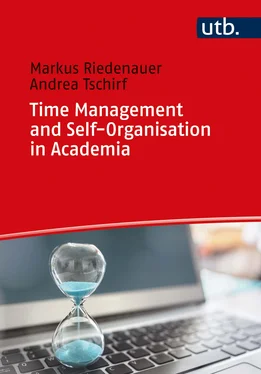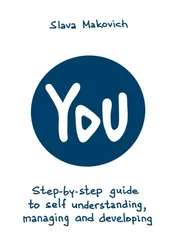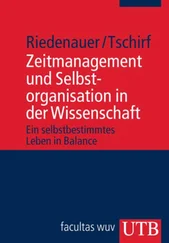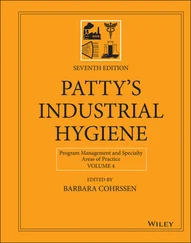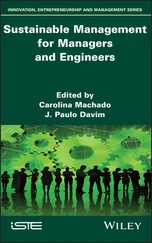Markus Riedenauer - Time Management and Self-Organisation in Academia
Здесь есть возможность читать онлайн «Markus Riedenauer - Time Management and Self-Organisation in Academia» — ознакомительный отрывок электронной книги совершенно бесплатно, а после прочтения отрывка купить полную версию. В некоторых случаях можно слушать аудио, скачать через торрент в формате fb2 и присутствует краткое содержание. Жанр: unrecognised, на английском языке. Описание произведения, (предисловие) а так же отзывы посетителей доступны на портале библиотеки ЛибКат.
- Название:Time Management and Self-Organisation in Academia
- Автор:
- Жанр:
- Год:неизвестен
- ISBN:нет данных
- Рейтинг книги:5 / 5. Голосов: 1
-
Избранное:Добавить в избранное
- Отзывы:
-
Ваша оценка:
- 100
- 1
- 2
- 3
- 4
- 5
Time Management and Self-Organisation in Academia: краткое содержание, описание и аннотация
Предлагаем к чтению аннотацию, описание, краткое содержание или предисловие (зависит от того, что написал сам автор книги «Time Management and Self-Organisation in Academia»). Если вы не нашли необходимую информацию о книге — напишите в комментариях, мы постараемся отыскать её.
Time Management and Self-Organisation in Academia — читать онлайн ознакомительный отрывок
Ниже представлен текст книги, разбитый по страницам. Система сохранения места последней прочитанной страницы, позволяет с удобством читать онлайн бесплатно книгу «Time Management and Self-Organisation in Academia», без необходимости каждый раз заново искать на чём Вы остановились. Поставьте закладку, и сможете в любой момент перейти на страницу, на которой закончили чтение.
Интервал:
Закладка:
The large Chapter IVexpands the contents of the time-management toolbox, its subchapters build on each other. We recommend working through them in the given order and to read supplementary Chapter Vfor better self-organisation in terms of information management, work location, and order at the workplace.
Chapter VIapplies the tools to the most important fields of scholarly activity and supplements them with specific methods, additional ideas, and references. For a deeper understanding, we recommend consulting Chapters I and II.
In the references, you will not only find further help, but also the exact bibliographical details of the citations and references, which are listed in footnotes with short titles only. However, texts mentioned only once are already cited in full in the respective note.
At the beginning of the chapters or subchapters, you will find a preview in italics of the topics that follow.
In these kinds of boxes, you will find many practical tips and hints.
•Questions set in blue font will help you select the methods that are appropriate for your situation. As you work through the questions, you will thereby individualise and adapt the tools. We highly recommend that you stop and write down your own insights, questions, and conclusions as you read. There are also a few blank pages at the end of the book for this purpose.
We are convinced that scholarly work is a beautiful, exciting, and fulfilling profession. We hope that this guidebook and workbook will also help you personally with its challenges. Good luck!
I.Specific Challenges in Academic Life—Institutional Factors
What it’s about:
Do external things distract you? Then make time for yourself to learn something worthwhile; stop letting yourself be pulled in all directions. But make sure you guard against the other kind of confusion. People who labour all their lives but have no purpose to direct every thought and impulse toward are wasting their time—even when hard at work.
Marcus Aurelius: Meditations II,7(transl. Gregory Hays, 2002)
Every profession brings with it typical challenges that must be recognised in order to adapt the overall methods of time management. Compared to other professions, scholarly work frequently offers greater freedom and opportunities, but these themselves result in new challenges. This chapter will help you understand the external factors that positively and negatively, challenge and foster your work. Finally, when considering how scholarship normally functions under typical institutional conditions, the chapter identifies some initial implications for time management.
Freedoms
Academic work usually allows above-average freedom and more personal creative space—both in terms of content and time management. This applies to research and to some extent still to teaching. For some, freedom was a motive to go into academia, and for some it is a motive to stay, despite opportunities to switch to a corporate or public service career (such as a government agency).
During their student days, many people became used to determining their daily routine largely by themselves, to being able to work mostly at home, to taking care of errands, doctor’s appointments or other things during the week in exchange for working in the evenings or on weekends, and to having few scheduled meetings during the lecture-free months. They may find it difficult to cope with core working hours from 9 a.m. to 5 p.m., compulsory presence in the office, daily commutes at rush hours and keeping count of every free day. 1Since this freedom regarding time means that days, weeks, and months have little external structure, with little control and feedback on effective use of time, this flexibility often becomes a trap, especially for young scholars. We will soon discuss the very high requirements associated with effective self-organisation and personal responsibility.
In many cases, a great deal of freedom is still given when choosing a topic to research. For example, in some humanities or the arts, dissertation supervisors or similar advisors only offer minimal assistance in finding and formulating a feasible research topic. Despite the efforts of many universities to better structure doctoral studies and professionalise supervision, a lot of time is often already lost at this stage. In contrast, the natural science, economics, technical, and medical disciplines often specify possible and desired topics for qualification theses and dissertations, especially when this involves funding, such as with third-party grants. Professors and department chairs enjoy greater freedom and, for their part, shape the freedom available to young academics.
Larger research projects, which of course also include dissertations, usually have little internal time structure. Where you do not work in well-organised teams, but mainly alone, where there are no limited and fixed times in the laboratory, you must structure sensibly the long period of multiple semesters or years, break down your project into substeps and subgoals, set target dates, and organise your weekly working hours. You can often make your own appointments for regular feedback to supervisors or colleagues and postpone them easily because they are seldom annoyed when a meeting is cancelled.
Teaching at a university used to be done with considerable freedom, the professor would proclaim his (or more rarely her) sovereign ‘decisions’ on the topics of their seminars or lectures. This has changed very much; the Bologna Process requirements to standardise degree programmes into modules resulted in predetermining most course content in all semesters. Even if the expansion of compulsory courses restricts opportunities for special lectures, new seminars, or alternative exercises, you can often exchange courses with lecturers within the institute or repeat courses that have already been held—possibly with different emphases. However, great creative freedom still remains with regard to the methods and didactics: structuring the material to be presented over the semester, deciding when to go in-depth or only survey a subject, choosing examples, selecting literature or other teaching aids, including methods of e-learning, partner or group work, giving space for discussions, etc.
These freedoms, which require a high degree of self-discipline, can inspire and motivate, but also disorientate. In part, other factors influence them.
•How free am I in my research, teaching, and time management?
•In which areas do I feel somewhat unfree?
•How important are my freedoms, what are they worth to me?
Challenges
Specific challenges for those working in academia follow directly from the previously outlined freedoms. An initial consequence is the difficulty of estimating the specific returns on investments of time and energy, which raises these kinds of questions:
•What difference will it make to the learning success of students if I thoroughly rework my lecture X or that course Y?
•How important is it to publish an essay or paper on a topic that is new to me and thus show broader competence? Is there any point in writing another paper on a topic I published on already?
•Is it worthwhile to get involved in a side topic of my dissertation, or does it tend to distract me from the essentials?
•Can I, for example, make an impact as a representative of the mid-level faculty in my department that would be reasonably proportional to the time spent on these extra efforts?
•How should I balance my research, teaching, and other commitments?
The success of individual activities in both research and teaching often becomes apparent only later, perhaps after years—while it also common knowledge that the most important factor in scholarly success is investing time. Therefore, it is important to set criteria for deciding on priorities and not become discouraged while waiting for signs of success. The less positive feedback you receive from outside, the less that academic work is externally motivated (such as by above-average salaries), the more important it becomes to cultivate, on the one hand, your intrinsic motivation and, on the other hand, to ensure that external incentives arrive regularly.
Читать дальшеИнтервал:
Закладка:
Похожие книги на «Time Management and Self-Organisation in Academia»
Представляем Вашему вниманию похожие книги на «Time Management and Self-Organisation in Academia» списком для выбора. Мы отобрали схожую по названию и смыслу литературу в надежде предоставить читателям больше вариантов отыскать новые, интересные, ещё непрочитанные произведения.
Обсуждение, отзывы о книге «Time Management and Self-Organisation in Academia» и просто собственные мнения читателей. Оставьте ваши комментарии, напишите, что Вы думаете о произведении, его смысле или главных героях. Укажите что конкретно понравилось, а что нет, и почему Вы так считаете.
